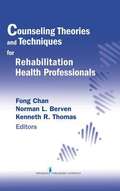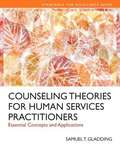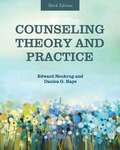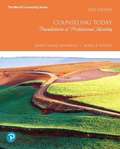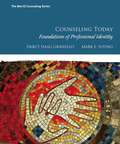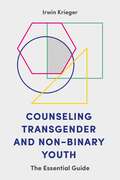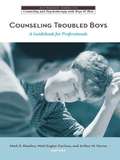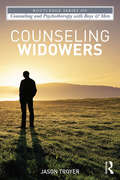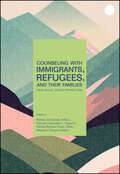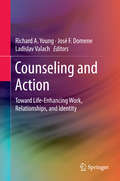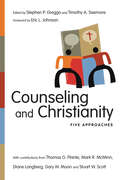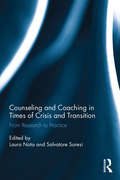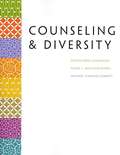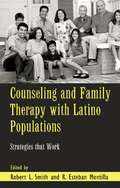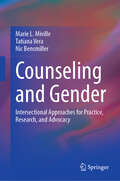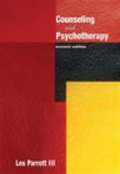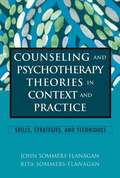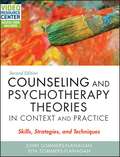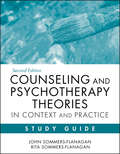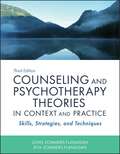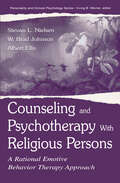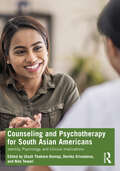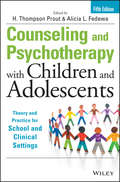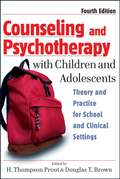- Table View
- List View
Counseling Theories and Techniques for Rehabilitation Health Professionals
by Fong Chan Norman L. Berven Kenneth R. ThomasForty-three American academics and practitioners discuss the dominant theories and techniques of counseling and psychotherapy from a rehabilitation perspective. Coverage includes reviews of ten psychodynamic, humanistic, and cognitive and behavioral approaches to counseling; basic techniques; considerations for specific types of disabilities; and professional issues. Each chapter includes a case example. Annotation ©2004 Book News, Inc., Portland, OR (booknews.com)
Counseling Theories and Techniques for Rehabilitation Health Professionals
by Fong Chan Norman L. Berven Kenneth R. ThomasForty-three American academics and practitioners discuss the dominant theories and techniques of counseling and psychotherapy from a rehabilitation perspective. Coverage includes reviews of ten psychodynamic, humanistic, and cognitive and behavioral approaches to counseling; basic techniques; considerations for specific types of disabilities; and professional issues. Each chapter includes a case example.
Counseling Theories for Human Services Practitioners: Essential Concepts and Applications
by Samuel T. GladdingCounseling Theories for Human Services Practitioners: Essential Concepts and Applications covers the major theories in counseling used in helping relationships today. This title explores counseling theories, how they develop, and how they influence perceptions and treatment of people. Each theory is applied to a single case history, showing the emphases and outcomes expected in this case. As part of the Standards for Excellence Series, this title assists students in associating CSHSE's National Standards to all levels of human service practice.
Counseling Theory And Practice
by Edward NeukrugDeveloped for helping professionals, the third edition of Counseling Theory and Practice explains what it means to be an effective helper, discusses foundations of classic counseling and psychotherapy theories, and provides an overview of emerging theories. Chapter 1 examines the efficacy of counseling and therapy, ethical concerns of counseling practice and provides students the opportunity to examine their view of human nature and how it aligns with the theories in the text. The rest of the book examines classic and emerging theories. Section 1 explores psychodynamic approaches, including psychoanalysis, Jungian therapy, and Adlerian therapy. Section 2 is devoted to existential-humanistic approaches such as existential therapy, Gestalt therapy, and person-centered counseling, while Section 3 discusses cognitive-behavioral approaches, including cognitive behavior therapy (CBT), rational-emotive behavior therapy (REBT), and reality therapy (RT). Section 4 describes post-modern therapies including narrative therapy, solution-focused brief therapy, and relational cultural therapy, a form of feminist therapy. New to this edition is the last section on the emerging theories of acceptance and commitment therapy (ACT), dialectical behavior therapy (DBT), and neurocounseling. In this edition, Ed Neukrug is joined by Danica Hays who uses her expertise on efficacy, cultural diversity, and gender issues to enhance each chapter. In addition to the new chapters on emerging theories, the text uses inclusive language and fully updated references, adds new vignettes, and highlights existing videos and websites created by Dr. Neukrug. This book is accompanied by an expanded Cognella Active Learning component for students comprised of videos, reflection exercises, PowerPoint slideshows, flashcards, and quizzes in a digital environment. This is an ideal text for both pre-service professionals and those already in the field.
Counseling Today: Foundations Of Professional Identity
by Mark E. Young Darcy H. GranelloCounseling Today: Foundations of Professional Identity does more than overview professional practice competencies--it actively engages students using relatable, real-life scenarios and effective pedagogical aids designed for the way they learn best. <p><p> As students are introduced to current research, controversial topics, and authentic counseling stories, they are challenged to think critically and reflect on what they learn. This approach keeps them involved in their learning as they acquire the skills they need to develop their professional identities. Filled with more first-person accounts, new social justice themes, over 300 updated reference citations, and the latest CACREP standards, the 2nd Edition gives readers true insight into the way that counseling is practiced today.
Counseling Today: Foundations of Professional Identity
by Mark E. Young Darcy GranelloThis innovative entrant into the foundations of counseling market meets the current generation of counseling students in the way they learn best-through meaningful pedagogical features and research-based content. Through its distinctive features, this text provides opportunities for students to reflect on what they are learning and explore independently through this process of reflection. The authors believe in the development of practitioners who learn through examining controversy, staying abreast of current research, and challenging their own thinking. Such practices will provide students with tools that will ultimately help them develop their professional identities.
Counseling Transgender and Non-Binary Youth: The Essential Guide
by Irwin KriegerThere are growing numbers of youth who identify as transgender, and as a result, clinicians and counselors are in need of an informed resource that covers the basics of gender identity and expression. This book responds to that need by setting out clear advice and support on working with transgender and non-binary youth with regard to their identity, mental health, personal and family life and their medical and social transition as well as offering additional resources and reading lists. Along with the basic information needed to understand transgender clients, Irwin Krieger applies this general knowledge to work with transgender teens at what can be the most critical and problematic stage in a trans person's life. Specifically, issues of gender identity awareness and expression for youth along with the mental and physical challenges that puberty presents are discussed. This guide will inform counselors and therapists to support transgender teens in their practice, while providing the necessary tools for opening up the conversation on transgender issues in families and schools.
Counseling Troubled Boys: A Guidebook for Professionals (The Routledge Series on Counseling and Psychotherapy with Boys and Men)
by Matt Englar-Carlson Mark S. Kiselica Arthur M. HorneThis volume provides practitioners with clear, helpful information about the process of understanding and engaging a wide array of boys and adolescent males in counseling. It supplies case examples and covers topics including race, ethnicity, religion, and other cultural factors of boys. A practical tool for school and mental health practitioners who need to understand and respond to the developmental and special issues of boys and adolescent males, Counseling Troubled Boys creates a bridge between young men and helping professionals. Key content includes adjustment issues, strategies for establishing rapport, interventions, case studies, and suggestions for future training and research.
Counseling Widowers (The Routledge Series on Counseling and Psychotherapy with Boys and Men)
by Jason M. TroyerWorking with widowers can be one of the most challenging parts of a therapist’s career. Despite the need for better research and professional guidance, therapists have often been left alone to confront a group struggling with high rates of suicide, mortality, physical health problems, and depression. Counseling Widowers builds from the latest developments in grief research and men’s studies to bridge the gap between counseling practice and the needs of bereaved men. In these pages, therapists will find tools for adjusting their clinical strategies to work more effectively with these men. Through a more empathic understanding of widowers, therapists can help them build from their strengths as they face the loss of their partner.
Counseling With Immigrants, Refugees, and Their Families From Social Justice Perspectives
by Patricia Arredondo Mary L. Fawcett Dawnette L. Cigrand Sandra Bertram Grant Rieko Miyakuni Dariyan AdamsImmigrants and refugees continue to make enormous contributions to the economic, educational, and cultural richness of the U.S. They plan for and manage multiple changes to achieve goals for themselves and their families, and in the process, give back to the U.S. This book provides insight for counselors working with immigrants and refugees and their families across the lifespan. Social justice and multicultural counseling competency frameworks ground this text, which is intended for counselors working in academic settings, conducting research, and practicing in different contexts. Because immigrants and refugees have various cultural heritages, immigration journeys, reasons for migrating, and presenting situations, counselors must be prepared to engage with individuals and families as unique clients. Descriptions of these contextual factors, including data and legislation, are included. This book will guide counselors in recognizing the additional steps they may need to take to account for culture, language, health status, relationships in place, and of course the priority issues (i.e., child’s illness and/or school bullying) to be dealt with. Additionally, counselors will learn about the rationale for migration as well as the concentration camps that may be “home” to refugees for an indeterminate time. Counselors will read about losses that affect immigrant and refugee clients and how these “naturally” contribute to sadness, depression, anger, and self-isolation. To purchase print copies, please visit the ACA Store. Reproduction requests for material from books published by ACA or any other questions about ACA Publications should be directed to publications@counseling.org. ACA no longer provides complimentary print desk copies. Digital evaluation copies may be requested from Wiley by clicking the link above and completing the details about your institution and course.
Counseling and Action: Toward Life-Enhancing Work, Relationships, and Identity
by Richard A. Young Ladislav Valach José F. DomeneEngaging in action is at the heart of our most meaningful experiences. And given the fast-paced, goal-driven nature of modern society, engagement in action is also central to how we perceive ourselves. Action has traditionally been viewed as an end product of the counseling process, but now a bold new redefinition makes counseling not only a driver of action, but an action in itself. Counseling and Action couples a timely update on the multiple roles of action in counseling with an action-based framework for enhancing progress between client and professional. Grounded in the core concepts of contextual action theory as well as key aspects of counseling (e. g. , identity, intentionality, emotion), the book explicates an approach that is responsive to client complexities and the larger social conditions that frame them. Expert-penned chapters apply theory to practice, illustrating levels of engagement in action as counselor and client negotiate goals and work toward their realization. And an especially useful section offers guidelines for intervening with specific populations and addressing particular issues. Among the topics covered: Designing projects for career construction. Agentic action in context. Counseling intentional addiction recovery grounded in relationships and social meaning. The action of mindfulness in counseling. A contextual action theory perspective on self-efficacy in individual counseling. Counseling processes and procedures through the lens of contextual action theory. With its forceful argument for a quantum leap in both theory and practice, Counseling and Action is transformative reading for professionals, educators, and graduate students in social work, psychotherapy, psychology, and counseling.
Counseling and Christianity: Five Approaches (Christian Association for Psychological Studies Books)
by Stephen P. Greggo Timothy A. SisemoreWhat does authentic Christian counseling look like in practice? This volume explores how five major perspectives on the interface of Christianity and psychology would each actually be applied in a clinical setting. Respected experts associated with each of the perspectives depict how to assess, conceptualize, counsel and offer aftercare to Jake, a hypothetical client with a variety of complex issues. In each case the contributors seek to explain how theory can translate into real-life counseling scenarios. This book builds on the framework of Eric L. Johnson's Psychology Christianity: Five Views. These include the Levels-of-Explanation Approach, the Integration Approach, the Christian Psychology Approach, the Transformational Approach and the Biblical Counseling Approach. While Counseling and Christianity can be used independently of Johnson's volume, the two can also function as useful companions. Christians who counsel, both those in practice and those still in training, will be served by this volume as it strengthens the connections between theory and practice in relating our faith to the mental health disciplines. They will finally get an answer to their persistent but unanswered question: "What would that counseling view look like behind closed doors?"
Counseling and Coaching in Times of Crisis and Transition: From Research to Practice
by Laura Nota Salvatore SoresiCounseling and Coaching in Times of Crisis and Transition explores how threats and challenges caused by rapid social and technological changes require counselors and coaches to rethink their usual ways of working, and, in some cases, even abandon their traditional theoretical anchors. The authors of this forward-thinking book argue that practitioners who aim to help others strengthen their resources can no longer afford to wait for clients in their offices or offer them protected, objective and neutral professional relationships. Contributors from around the world argue that there is a real need for new counseling and coaching actions to be delivered in different contexts: counselors and coaches should be able to use heterogeneous languages and interventions, as well as numerous relationship modalities and activities in order to streamline the support that they offer to people in sectors as diverse as health and well-being, life and career design, prevention and community inclusion, work inclusion, and schools. The book provides an evidence-based framework, with numerous counseling and coaching examples that are capable of promoting people’s strengths, whether this be face-to-face, in groups, or online. This book will appeal to academics, researchers and postgraduate students in the fields of counseling and coaching, as well as those with an interest in psychological, social and educational science. It should also be essential reading for practitioners and policymakers in a diverse range of contexts, including those working on intervention and support for vulnerable people, non-traditional and disadvantaged students, and people with disabilities.
Counseling and Diversity
by Devika Dibya Choudhuri Azara Santiago-Rivera Michael Tlanusta GarrettPacked with real-world applications and excerpts from original sources, COUNSELING AND DIVERSITY addresses the three dimensions of multicultural counseling competency (awareness, knowledge and skills) while increasing readers' understanding of oppression and the structures of power. This innovative First Edition addresses the constructs of culture, worldview, race, ethnicity, gender, age, sexual orientation, physical and mental ability, socioeconomic class, and spirituality and religion as complex dimensions of social and personal identity.
Counseling and Family Therapy with Latino Populations: Strategies that Work (Routledge Series on Family Therapy and Counseling)
by Robert L. Smith and R. Esteban MontillaFor the Latino population, the family bond is powerful and enduring. Family serves as the primary source of support, care, guidance, and healing; all difficulties that arise for an individual are surmounted together. Therefore, a practitioner working with a Latino client must gain the trust and respect of the family in order to carry out treatment efficiently. He or she must essentially become a part of that family to encourage members to share their issues without the concern of breaching the confidence of the family. Counseling and Family Therapy with Latino Populations helps the therapist to join the Latino family in order to identify and explore the difficulties that threaten their welfare. With this fundamental principle as the basis, the book's editors and contributors write chapters that focus on work with children and adolescents, group counseling and substance abuse counseling. They incorporate specific case studies, methods, and strategies for intervention and provide insight into the cultural relevance behind each example. This book is a necessary resource for therapists working with Latino clients who wish to offer effective techniques while continuing to value the integrity of family tradition.
Counseling and Gender: Intersectional Approaches for Practice, Research, and Advocacy
by Marie L. Miville Tatiana Vera Nic BensmillerThis book introduces mental health professionals and students to gender issues involved in professional practice, research, and teaching. The book emphasizes an intersectional and inclusive framework as an effective way to better understand gender, addressing the available evidence for defining and measuring gender and gender-related psychological processes, as well as discussing the social/political implications of gender for individuals, families, and the larger society. The authors describe racial, cultural, and ethnic underpinnings that are key to understanding the definition and impact of gender in the daily lives of individuals, families, and communities, as well as the larger society. Among the topics discussed: Cultural and historical bases of gender, especially gender roles and the gender binary Experiences of privilege and oppression Prejudice and discrimination based on gender Intersections of gender and social group experiences, based on race ethnicity, socioeconomic status (SES) and sexual orientation Common clinical concerns, including relationships, families, education and career Affirmative and liberatory therapies
Counseling and Psychotherapy (2nd edition)
by Les ParrottThis book will help students break the field of counseling into manageable pieces that can more easily be studied, critiqued, and eventually assimilated into the student's understanding. The book provides a brief overview of the counseling profession and in-depth information on 10 major theoretical orientations. The author's writing style and presentation of the theories provide students with the foundations for understanding the field of counseling in an accessible manner.
Counseling and Psychotherapy Theories in Context and Practice
by John Rita Sommers-FlanaganLearn the various counseling theories through authentic examples led by actual practitioners working with real clients This comprehensive two-DVD set promotes student learning by illustrating each of the counseling theories covered in the textbook Counseling and Psychotherapy Theories in Context and Practice, Second Edition by John and Rita Sommers-Flanagan. However, the DVDs can be used in conjunction with this text or as a stand-alone teaching tool in any course covering psychotherapy theories and techniques. Unique in its presentation of real clinicians from a variety of work settings--including school and college counselors--working with actual clients, the DVDs: Feature practitioners and clients who represent ethnic, gender, age, and religious diversity Model how to develop a positive therapeutic relationship from any theoretical perspective Help students not only understand the differences between theories, but also the difference between theory and technique Offer commentary by the authors on how the counselor in the session made decisions from a theoretical perspective as well as why a particular counseling theory was appropriate for the client's situation Exploring Psychoanalytic, Adlerian, Existential, Person-Centered, Gestalt, Behavioral, Cognitive-Behavioral, Reality, Feminist, Solution-Focused, and Family Systems theories, these two DVDs shed light on these theories in real practice with clients.
Counseling and Psychotherapy Theories in Context and Practice
by John Sommers-Flanagan Rita Sommers-FlanaganA comprehensive, in-depth exploration of the origins, contemporary developments, and applications to practice related to each major counseling theory Fully revised and updated, Counseling and Psychotherapy Theories in Context and Practice, Second Edition is complete with useful learning aids, instructions for ongoing assessment, and valuable case studies--all designed to facilitate comprehension and lead to effective, ethical practice.The Second Edition features:New chapters on Family Systems Theory and Therapy as well as Gestalt Theory and TherapyExtended case examples in each of the twelve Theory chaptersA treatment planning section that illustrates how specific theories can be used in problem formulation, specific interventions, and potential outcomes assessmentDeeper and more continuous examination of gender and cultural issuesAn evidence-based status section in each Theory chapter focusing on what we know from the scientific research with the goal of developing critical thinking skillsA new section on "Outcome Measures" that provides ideas on how client outcomes can be tracked using practice-based evidenceShowcasing the latest research, theory, and evidence-based practice, Counseling and Psychotherapy Theories in Context and Practice, Second Edition is an engaging and illuminating text."John and Rita Sommers-Flanagan have done it again! In the revised Second Edition of their popular book, they have masterfully organized and written a compelling text that will appeal to students and faculty alike. The Second Edition is thoroughly pragmatic with careful attention to research and evidence-based literature. Much to the delight of readers, extensive case analyses that illustrate major theoretical concepts abound."--Sherry Cormier, PhD, Professor Emerita, West Virginia University, coauthor of Interviewing and Change Strategies for Helpers"John and Rita Sommers-Flanagan have written an exceptionally practical text for students wishing to learn usable counseling principles. Their excellent scholarship is balanced by a superb treatment of counseling theory that includes a review of the strengths, limitations, and means for implementing the systems represented."--Robert Wubbolding, EdD, Professor Emeritus, Xavier University; Director, Center for Reality Therapy; author of Reality Therapy (Theories of Psychotherapy Series)"This introductory text is written with extraordinary care and attention to detail. Not only is it one of the best resources I know of for in-depth coverage of classical therapeutic theory, it is also one of the best at illuminating cutting-edge developments, both in theory and application. Readers will greatly benefit from the clarity, comprehensiveness, and personal perceptiveness of this engaging introductory guide."--Kirk J. Schneider, PhD, Faculty, Saybrook University; Vice President, Existential-Humanistic Institute; coauthor of Existential-Humanistic Therapy and editor of Existential-Integrative Psychotherapy
Counseling and Psychotherapy Theories in Context and Practice Study Guide
by John Sommers-Flanagan Rita Sommers-FlanaganExpand and reinforce your understanding of counseling and psychotherapy theoriesThis supplementary resource to Counseling and Psychotherapy Theories in Context and Practice, Second Edition will further deepen your understanding of three key components of counseling and psychotherapy theory and practice: self-awareness, knowledge, and application and skill development.This Study Guide offers:A pre-test and post-test in each chapter that will orient you to key theoretical principles and evaluate how well those principles fit with your values and beliefsAn opening and closing professional development essay written by a student, practitioner, or faculty member who is active within the counseling or psychology professionsMultiple-choice practice tests for each chapter to reinforce important theories and conceptsA comprehensive short-answer question review for each chapterPractice activities designed to help students experience and practice implementation of each theoryCritical reflections on each theoryCrossword puzzles to keep learning funA glossary of key terms for each chapterInstructor Site: www.wiley.com/go/counselingtheoriesStudent Resource Site: www.wiley.com/go/counselingtheories
Counseling and Psychotherapy Theories in Context and Practice: Skills, Strategies, and Techniques
by John Sommers-Flanagan Rita Sommers-FlanaganThe textbook is more tightly organized. Every chapter leads with refined learner objectives. To help readers immediately grasp the theories, key terms are defined very early in each chapter. Based on reviewer passion for diversity and spirituality, new sections and content are integrated into all of the 12 major theory chapters. Each chapter now includes sections titled (a) cultural sensitivity, (b) gender and sexuality, and (c) spirituality. Neuroscience is also a new feature. Although the text continues to focus on nonmedical approaches to counseling and psychotherapy, information on the brain is included throughout, via a feature called the "Brain Box." New content is distributed throughout the text. There are over 250 new, cutting edge citations. These citations address a wide range of issues, including the latest reviews and meta-analyses on the evidence-based status of specific counseling and psychotherapy approaches. The end of every chapter includes a list of key terms.
Counseling and Psychotherapy With Religious Persons: A Rational Emotive Behavior Therapy Approach (Lea's Personality And Clinical Psychology Ser.)
by Albert Ellis W. Brad Johnson Stevan L. NielsenPractitioners are increasingly aware that religious persons present unique problems and challenges in therapy. Rational-Emotive Behavior Therapy (REBT) is among the most widely practiced, highly structured and active directive approaches to treating emotional and behavioral problems. Introduced by Albert Ellis in the early 1950s, REBT is the original cognitive-behavioral psychotherapy and its efficacy has been supported by hundreds of treatment outcome studies. A uniquely belief-focused therapy, REBT is usually quite appealing to clients from Christian, Jewish, Muslim, Hindu, and other religious traditions, who respond favorably to REBT's focus on right belief, active engagement in the work of therapy, and reading/practice focused homework. In this practical and user-friendly guide, the authors outline the congruence between the therapeutic approach of REBT and the presenting problems and concerns of religious persons. They describe an approach to reconciling the sacred traditions and beliefs of religious clients with the no nonsense techniques of REBT. They review the essential components of practice with religious clients--including assessment, diagnosis and problem formulation, disputation of irrational beliefs, and other REBT techniques, highlight the primary obstacles facing the therapist when treating religious clients, and offer many case examples from work with this important client population. Mental health professionals from all backgrounds will benefit from the detailed yet manual-focused approach to helping religious clients overcome all forms of emotional distress.
Counseling and Psychotherapy for South Asian Americans: Identity, Psychology, and Clinical Implications
by Nita Tewari Ulash Thakore-Dunlap Devika SrivastavaThis essential text explores what it means to be a South Asian American living in the US while seeking, navigating and receiving psychological, behavioral or counseling services. It delves into a range of issues including cultural identity, racism, colorism, immigration, gender, sexuality, parenting, and caring for older adults. Chapter authors provide research literature, clinical and cultural considerations for interviewing and treatment planning, case examples, questions for reflection, suggested readings, and resources. The book also includes insights on the future of South Asian American mental health, social justice, advocacy, and public policy. Integrating theory, research, and application, this book serves as a clinical guide for therapists, instructors, professors and supervisors in school/university counseling centers working with South Asian American clients, as well as for counseling students.
Counseling and Psychotherapy with Children and Adolescents
by H. Thompson Prout Alicia L. FedewaA comprehensive, theory-based approach to working with young clients in both school and clinical settingsCounseling and Psychotherapy with Children and Adolescents, Fifth Edition provides mental health professionals and students with state-of-the-art theory and practical guidance for major contemporary psychotherapeutic schools of thought. Children and adolescents are not just small adults; they have their own needs, requirements, and desires, on top of the issues presented by still-developing brains and limited life perspective. Providing care for young clients requires a deep understanding of the interventions and approaches that work alongside growing brains, and the practical skill to change course to align with evolving personalities. The thoroughly revised fifth edition is a comprehensive reference, complete with expert insight.Organized around theory, this book covers both clinical and school settings in the fields of psychology, counseling, and social work. Coverage of the latest thinking and practice includes Cognitive Behavioral, Rational-Emotive, Reality Therapy, Solution Focused, Family Systems, and Play Therapy, providing a complete resource for any mental health expert who works with young people.Understand the major approaches to counseling and psychotherapeutic interventionsDiscover the ethical and legal implications of working with children and adolescentsLearn how to employ culturally responsive counseling with younger clientsExamine interventions for children and adolescents with disabilities and health care needsThis updated edition includes a stronger emphasis on the clinical application of theory to specific disorders of childhood and adolescence, and new coverage of the legal and ethical issues related to social media. Chapters include a case studies and online resources that make it ideal for classroom use, and new chapters on Solution-Focused Therapy and Play Therapy enhance usefulness to practicing therapists. Expert guidance covers techniques for working with individuals, groups, and parents, and explores the efficacy of the theories under discussion.
Counseling and Psychotherapy with Children and Adolescents
by H. Thompson Prout Douglas T. BrownCovering all the major approaches to counseling children and adolescents-including psychodynamic, Adlerian, person-centered, cognitive-behavioral, rational-emotive, reality therapy, solution focused, and family systems-Counseling and Psychotherapy with Children and Adolescents, Fourth Edition equips you to become familiar with the latest thinking and practice in counseling and psychotherapeutic interventions with children and adolescents.
